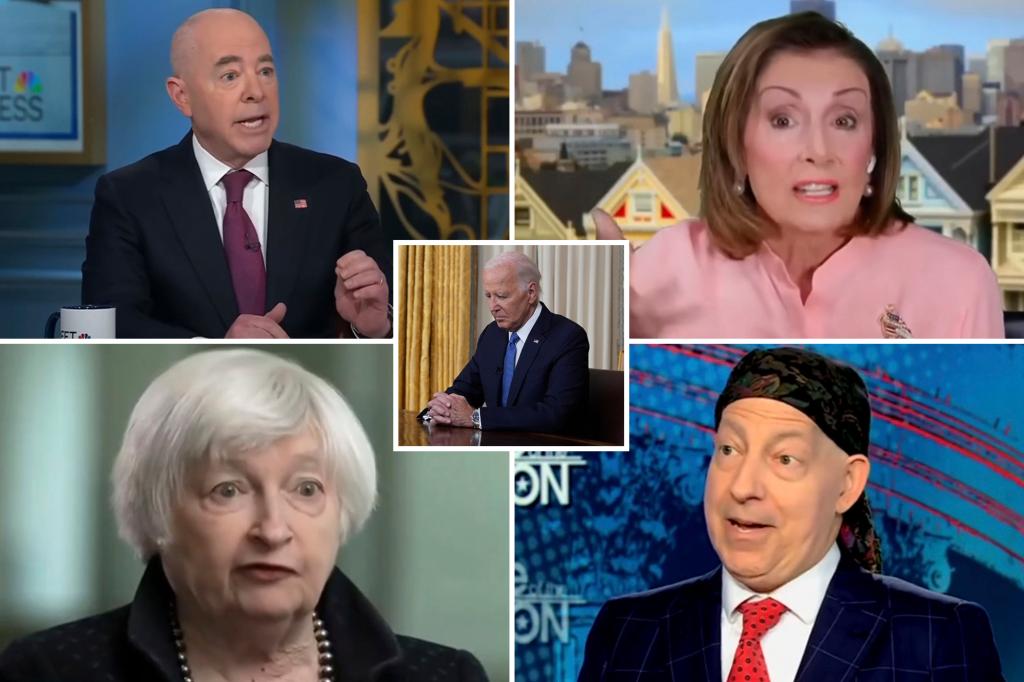Paragraph 1: The Genesis of the Controversy
The political landscape leading up to the 2024 presidential election has been marked by intense scrutiny of President Biden’s cognitive abilities. This scrutiny intensified following a televised debate where, according to some observers, the president’s mental acuity appeared diminished. Adding fuel to the fire, former President Donald Trump shared a compilation video highlighting numerous instances of Democratic officials and figures vehemently defending Biden’s mental sharpness. This video, set to the lighthearted Wii theme music, juxtaposed these pronouncements with clips suggesting a contrasting narrative, including polling data indicating widespread public concern about Biden’s age and fitness for office. The video’s release, and the subsequent media storm, ignited a heated debate about the president’s cognitive health, the media’s role in covering it, and the ethical implications of using such issues in political campaigns.
Paragraph 2: Trump’s Strategic Deployment of the Video
Trump’s sharing of the video, without any accompanying commentary, can be interpreted as a calculated political maneuver. By presenting the curated clips of Democrats praising Biden’s mental state, contrasted with data suggesting public doubt, Trump aimed to sow seeds of uncertainty and potentially undermine confidence in the incumbent president. This strategy aligns with a broader pattern of Trump utilizing social media and public appearances to attack his political opponents, often employing provocative and attention-grabbing tactics. The timing of the video’s release, shortly after a critical news report questioning Biden’s fitness for office, further amplified its impact and fueled the ongoing discussion about the president’s cognitive abilities.
Paragraph 3: The Media’s Role in Scrutinizing Presidential Fitness
The controversy surrounding Biden’s mental fitness highlights the complex and often delicate role of the media in scrutinizing the health of political leaders. Veteran CBS News reporter Jan Crawford’s critique of the media’s handling of Biden’s perceived cognitive decline added another layer to the debate. Crawford argued that the media had been remiss in adequately questioning Biden’s fitness for office, possibly contributing to the lack of a strong Democratic primary challenger. This criticism underscores the tension between respecting a politician’s privacy and fulfilling the journalistic duty to inform the public about matters of significant national importance, especially those related to the capacity of a president to effectively discharge their duties.
Paragraph 4: The White House Response and the Democratic Defense
The White House and prominent Democrats have consistently pushed back against concerns about President Biden’s mental acuity. White House Press Secretary Karine Jean-Pierre has repeatedly dismissed such questions, emphasizing the president’s demanding schedule and extensive experience. Other high-ranking officials, including cabinet members and congressional leaders, have echoed this sentiment, portraying Biden as a sharp and capable leader. First Lady Jill Biden has also defended her husband, highlighting his wisdom and experience as assets. This unified defense seeks to portray the concerns about Biden’s mental fitness as politically motivated attacks and to reassure the public of his ability to continue serving as president.
Paragraph 5: The Underlying Tension Between Age and Experience
The debate surrounding Biden’s age and cognitive abilities raises broader questions about the role of age and experience in leadership. While proponents of Biden emphasize his long career in public service and deep understanding of policy issues, critics argue that his advanced age may pose challenges to the demanding physical and mental requirements of the presidency. This tension is reflected in the contrasting views presented in the video shared by Trump, juxtaposing statements praising Biden’s experience with data suggesting public apprehension about his age. The ongoing discussion reflects a societal grappling with the balance between valuing the wisdom of seasoned leaders and acknowledging the potential limitations imposed by age.
Paragraph 6: The Ethical and Political Implications
The controversy surrounding Biden’s mental fitness also raises important ethical and political considerations. Critics of Trump’s video argue that it trivializes a serious issue and contributes to the politicization of health concerns. They suggest that using a president’s health as a political weapon could create a dangerous precedent and discourage individuals with health challenges from seeking public office. On the other hand, supporters of Trump’s actions argue that the public has a right to know about a president’s health, and that concerns about Biden’s cognitive abilities are legitimate and should be openly discussed. This debate highlights the complex intersection of health, politics, and public discourse in the digital age, and the challenges of navigating these sensitive issues responsibly.










